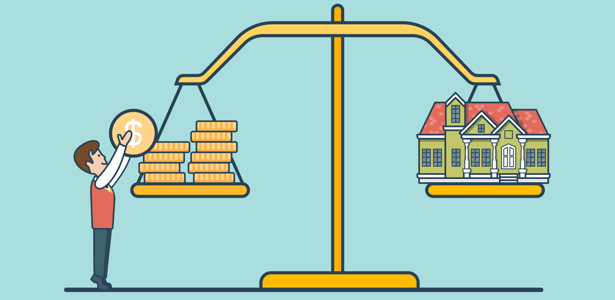A home is most enjoyed when it doesn’t become a point of worry in your life. But one thing is for certain, if you’re house poor, you won't be able to truly enjoy all the perks that come with homeownership.
Generally speaking, being "house poor" refers to homeowners who spend more than 40% of their gross monthly income on their home. Of course, no one plans for this when they first purchase a home, but it’s a common problem that takes homeowners by surprise.
Thankfully, there are things you can do before you purchase your home to lessen the possibility of finding yourself in this situation. Here are seven sure-fire ways to prevent you from spending too much of your monthly income on a new home.
1. Don’t Buy More Than What Is Affordable
Let’s start with the obvious. Don’t buy a home more expensive than what you can afford. Also, keep in mind the value of the mortgage you qualify for isn’t always representative of what you can afford either. It's possible you could qualify for more than you could reasonably pay in your monthly mortgage payments.
2. Live By The 32% Rule
The Canadian Mortgage and Housing Corporation (CMHC) states your housing costs shouldn’t exceed 32% of your household monthly gross income. By calculating how much you could afford to budget for mortgage payments, you can ensure your lifestyle is not negatively impacted once you move into your new home.
3. Avoid Mortgage Insurance
Another way you can avoid becoming house poor is by reducing your monthly housing expenses. With current interest rates still low, you can rest assured you’ll still have this working in your favour. But another way you can lower your monthly costs is by purchasing your home with a down payment of 20%. By doing this you won’t have to pay for mortgage insurance, leaving you more wiggle room on a monthly basis.

4. Set a Budget, Stay Within It
After you’ve calculated how much you can afford for monthly housing costs, turn your attention to the rest of your expenses. For some, the realization you can afford higher payments will be happy news. But keep in mind this will mean cutting back on other discretionary spending.
Draft a budget that ensures you'll have enough money to pay your mortgage along with everything else. The purpose here is to avoid running up debt on credit cards and other lines of credit in order to pay your mortgage. Before you purchase your new home, draft a budget and keep yourself within it to ensure you can realistically make whatever changes you need to your buying habits.
5. Minimize Your Debt
Similar to budgeting, reducing your personal debt as much as you can prior to purchasing will provide protection from becoming house poor. Ask yourself how much income you’d have left once you paid your mortgage and bills. If you’d be left with little to no money, you should address this as much as possible. Whether you consolidate your debts in order to make a smaller monthly payment, or you pay off more of your debt, you'll be in a much better position once you purchase your home.
6. Beware Of Variable Rates
Variable rates are great during times like these when interest rates have been at a historic low since 2008. If you decide to get a mortgage on a variable rate, it will provide you savings at the moment while rates are low. However, you'll want to ask yourself whether you'll be able to afford your payments should interest rates increase.
If a change in interest rates would make your mortgage payments unaffordable, consider locking into a fixed rate. Canada’s new mortgage rules will help you assess what you could afford should interest rates increase. You may pay more right now but you'll have peace of mind knowing you'll be able to afford your home in the years to come.
7. Figure Out Additional Costs
It’s important to remember you'll incur additional expenses over and above your mortgage payments every month. You’ll want to budget money for property taxes, home repairs, as well as lawn care and snow removal. There will always be some home costs you don’t expect, but by factoring in as many of these expenses as possible, you'll be better prepared to manage them when they do come up.
When all is said and done, the overarching theme is to live within your means. Doing so will mean you'll be able to enjoy the new home you purchase, while also having the peace of mind knowing paying for it won’t become a burden.




